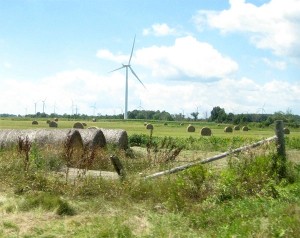Ontario municipalities push back on wind power
Wind farms continue to generate disagreement. The issue tends to be two-fold: debate about possible health effects for those near turbines and battles over who decides what gets approved and where it goes.

Wind turbines on Wolfe Island now dominate the view there and are also visible from Kingston Ontario. Photo: Lucy Martin
In Ontario, the current policy gives approval authority to the province. The top-down approach has become something of a political hot potato. That’s partially a standard NIMBY problem and partially because the province’s over-all energy policies have been the subject of controversy and scandal.
Details of that larger energy policy are layered and complex. Gas power plants were cancelled at great expense with a lack of accountability and transparency. (Indeed, the political side of that issue was big enough to be part of long-time Liberal Premier Dalton McGunity’s unexpected decision to step down.)
Bringing that back to wind power, critics complain surplus wind power (too much at the wrong time) must be sent to the U.S. power grid at a steep financial loss to Ontario ratepayers. The Liberal policy’s push for promised wind farms has also resulted in painful David-vs-Goliath battles between small wind opponents and large companies.
Taken as a whole, the tangle of poor implementation also causes dismay at the loss of positive momentum in seeking “green” solutions. Or put another way: it’s hard to assess the pros and cons of wind power if it’s part of a larger muddle that is hard to defend.
More recently Ottawa Citizen reported on growing rebellion at municipal levels of government in Ontario:
A coalition of 62 communities in Ontario have declared themselves “unwilling hosts” to provincially approved windmills and they’re demanding that Premier Kathleen Wynne’s government allow municipal governments to choose whether and where to put industrial wind projects.
Wind farms have become a political wedge issue that forces Ontario’s ruling (minority) Liberal government to tread carefully. As reported in the Citizen on 8/20:
Progressive Conservative Party leader Tim Hudak told 1,600 delegates gathered at the annual Association of Municipalities of Ontario conference this week that, if elected, he would “scrap the Green Energy Act” entirely. If communities don’t want windmills, the municipality should not be “forced” to house “industrial wind turbines,” Hudak said.
New Democratic Party leader Andrea Horwath said “short-sighted” decisions on the energy file have created a needless backlash against wind power in communities that feel inadequately consulted.”
While those 66 declared communities are just a fraction of the province’s 444 municipalities, the conservative-friendly Toronto Sun says the “not a willing host” movement is strong and growing:
“It was important for someone to keep this list and say, ‘You are not alone,’” said Wind Concerns president Jane Wilson.
“Wind power can work,” she conceded, “but plunking them (turbines) down, right next to communities and next to homes and schools, is not the right idea.”
Of course, the “who decides” battle is nothing new. Similar jurisdictional frustrations exist in New York State, where passage of something called Article X, which created a one-stop approval process at the state level for energy plants and wind farms.
Do you think there is a way to do wind “right”, so to speak? Get enough agreement and buy-in so the heated battles become general acceptance? Or is there no where to put a wind farm that won’t have some faction crying foul and pushing back?
Tags: Ariicle X, canada, economy, energy, local control, Ontario, politics, wind power





.jpg)
.png)

Communities that reject wind power should be placed on the siting list for new coal fired plants. There is a way to do these things right, but money, or should I say greed, usually complicates what should be a fairly simple discussion.
Canada has 243,000 miles of coastline, and whole population groups that will be impacted by sea level rise due to climate change. We (humans) still have a brief opportunity to reduce these impacts, but we will need to do the right thing. Fighting over money won’t move us forward; Investing in tar sands won’t move us forward; subsidizing the gas industry won’t move us forward. Siting and building green infrastructure takes time, and arguing in the courts and legislatures only postpones what needs to be done.
Nuclear provides more power than wind or solar.
I think the complaints are very localized and I think they are real to some degree.
Nobody wants to think about where power is from or how we get it as long a we don’t have to look at it. It is rather ironic that Canada would oppose wind power while at the same time be producing this pretty bad tar sands oil, of course that is produced in a place where no one lives in Canada.